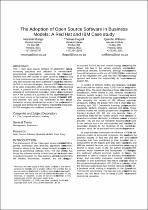 ResearchSpace
ResearchSpace
Adoption of open source software in business models: a Red Hat and IBM case study
JavaScript is disabled for your browser. Some features of this site may not work without it.
- ResearchSpace
- →
- Research Publications/Outputs
- →
- Conference Publications
- →
- View Item
| dc.contributor.author |
Munga, N

|
|
| dc.contributor.author |
Fogwill, T

|
|
| dc.contributor.author |
Williams, Q

|
|
| dc.date.accessioned | 2010-01-12T10:35:26Z | |
| dc.date.available | 2010-01-12T10:35:26Z | |
| dc.date.issued | 2009-10 | |
| dc.identifier.citation | Munga, N, Fogwill, T and Williams, O. 2009. Adoption of open source software in business models: a Red Hat and IBM case study. Annual Research Conference of the South African Institute of Computer Scientists and Information Technologists (SAICSIT), Vanderbijlpark, South Africa, 12-14 October 2009, pp 112-121 | en |
| dc.identifier.isbn | 978-1-60558-286-3 | |
| dc.identifier.uri | http://hdl.handle.net/10204/3879 | |
| dc.description | Copyright: ACM 2009. This is the author's version of the work. It is posted here by permission of ACM for your personal use. Not for redistribution. The definitive version was published in Proceedings of the South African Institute of Computer Scientists and Information Technologists (SAICSIT) Conference | en |
| dc.description.abstract | Free / Libre open source software (FLOSS/OSS) has gained increasing popularity and utilisation in commercial and governmental organisations. Universities like Harvard and Stanford now offer courses on open source as a business and also on how businesses can compete with open source firms. However, very little research has been published in regards to the influence of OSS on business strategies; the use of OSS as a viable business or its value proposition within a commercial entity. The business model, a powerful tool for extracting economic value from the potential of technological innovation, clearly plays an important role in the success of a business. In this paper we investigate the role of open source in the business models of Red Hat and IBM and describe how OSS has contributed to their success. A framework recently developed by some of the authors is used to evaluate and identify the key factors important to the integration of OSS strategies into traditional business models. | en |
| dc.language.iso | en | en |
| dc.publisher | Association for Computing Machinery (ACM) | en |
| dc.subject | Free / Libre | en |
| dc.subject | Open source software | en |
| dc.subject | Business models | en |
| dc.subject | FLOSS | en |
| dc.subject | Business models | en |
| dc.title | Adoption of open source software in business models: a Red Hat and IBM case study | en |
| dc.type | Conference Presentation | en |
| dc.identifier.apacitation | Munga, N., Fogwill, T., & Williams, Q. (2009). Adoption of open source software in business models: a Red Hat and IBM case study. Association for Computing Machinery (ACM). http://hdl.handle.net/10204/3879 | en_ZA |
| dc.identifier.chicagocitation | Munga, N, T Fogwill, and Q Williams. "Adoption of open source software in business models: a Red Hat and IBM case study." (2009): http://hdl.handle.net/10204/3879 | en_ZA |
| dc.identifier.vancouvercitation | Munga N, Fogwill T, Williams Q, Adoption of open source software in business models: a Red Hat and IBM case study; Association for Computing Machinery (ACM); 2009. http://hdl.handle.net/10204/3879 . | en_ZA |
| dc.identifier.ris | TY - Conference Presentation AU - Munga, N AU - Fogwill, T AU - Williams, Q AB - Free / Libre open source software (FLOSS/OSS) has gained increasing popularity and utilisation in commercial and governmental organisations. Universities like Harvard and Stanford now offer courses on open source as a business and also on how businesses can compete with open source firms. However, very little research has been published in regards to the influence of OSS on business strategies; the use of OSS as a viable business or its value proposition within a commercial entity. The business model, a powerful tool for extracting economic value from the potential of technological innovation, clearly plays an important role in the success of a business. In this paper we investigate the role of open source in the business models of Red Hat and IBM and describe how OSS has contributed to their success. A framework recently developed by some of the authors is used to evaluate and identify the key factors important to the integration of OSS strategies into traditional business models. DA - 2009-10 DB - ResearchSpace DP - CSIR KW - Free / Libre KW - Open source software KW - Business models KW - FLOSS KW - Business models LK - https://researchspace.csir.co.za PY - 2009 SM - 978-1-60558-286-3 T1 - Adoption of open source software in business models: a Red Hat and IBM case study TI - Adoption of open source software in business models: a Red Hat and IBM case study UR - http://hdl.handle.net/10204/3879 ER - | en_ZA |





